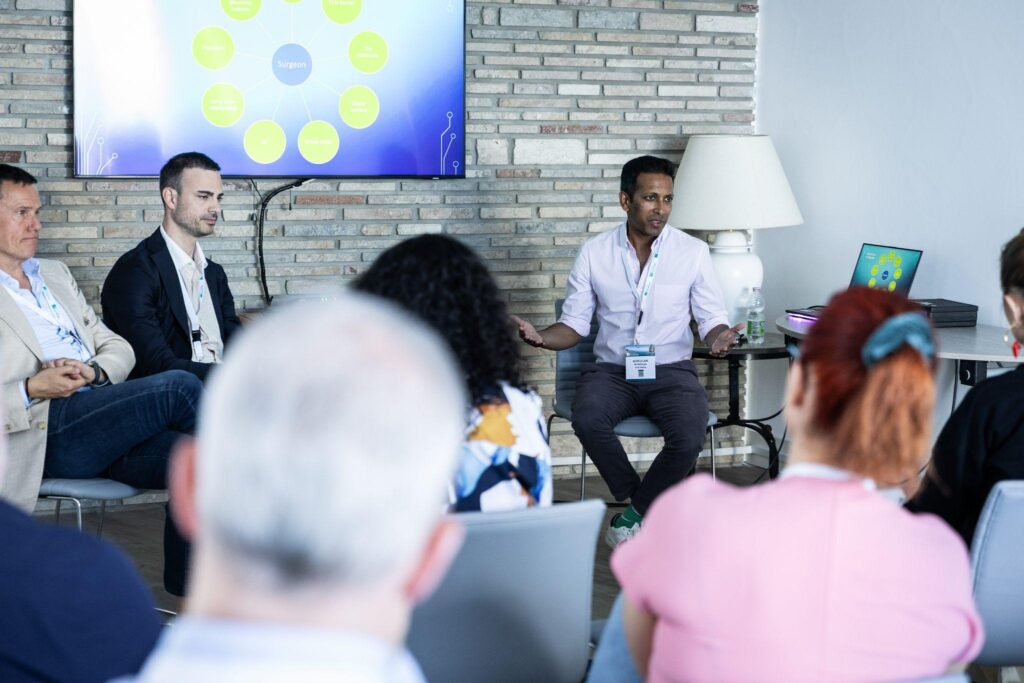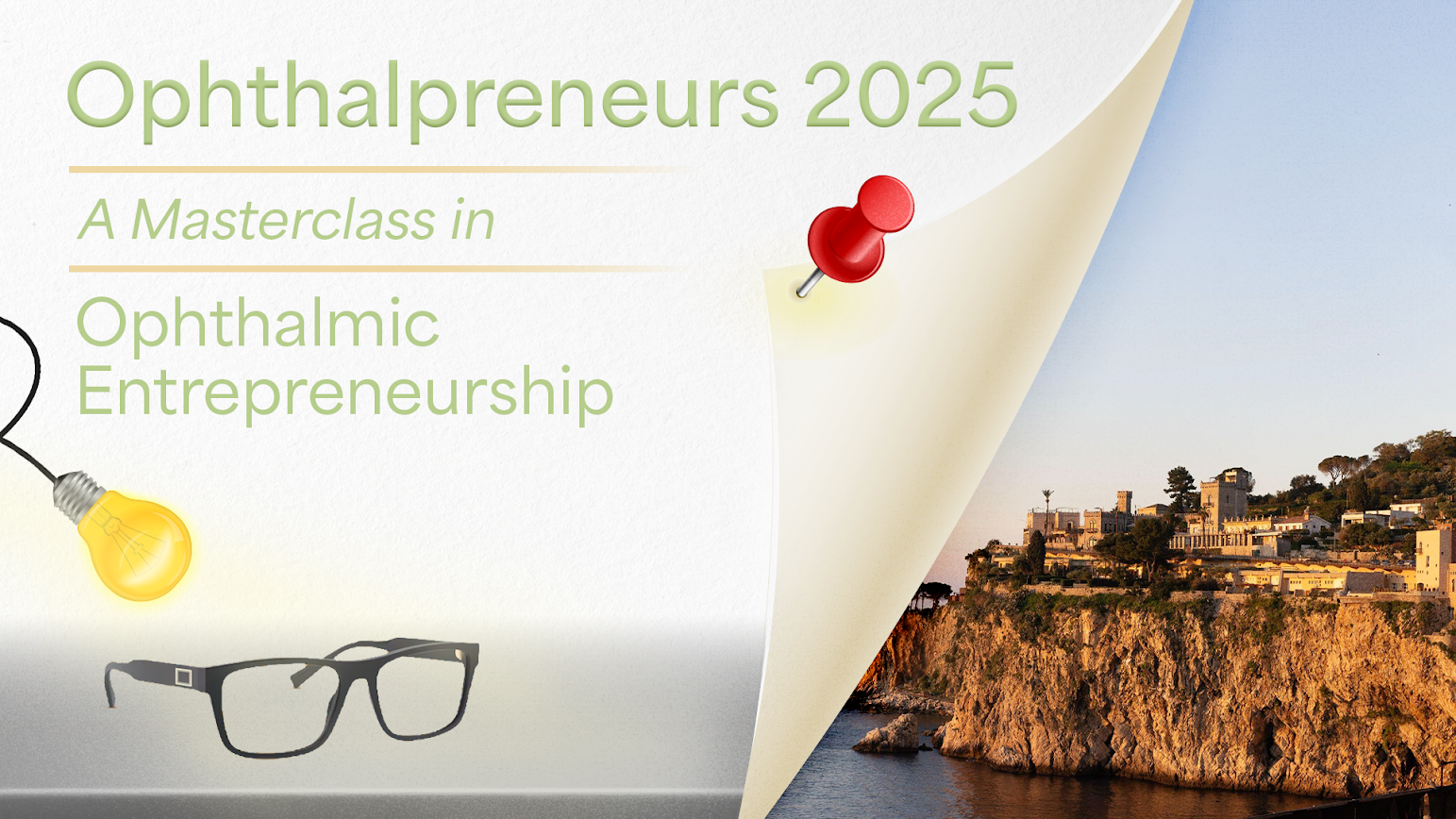Ophthalpreneurs 2025 delivered big on business, bold ideas and eye-opening insights for the modern ophthalmologist.
After the debut of Ophthalpreneurs (OPS) last year, expectations were understandably high. I arrived in Taormina with cautious optimism and left with something altogether rarer—genuine inspiration, a full notebook, and a strong desire to overhaul half of my to-do list.

But before I wax lyrical, let’s begin with a bit of background for those not yet inducted into the OPS fold.
What is OPS—and why should you care?
Ophthalpreneurs is no ordinary conference. It’s not a congress, a symposium, or a retreat. It’s a curated gathering of the independently minded, a space designed for those navigating the often exhilarating, sometimes exasperating, world of private and patient-pay ophthalmology.
Think of it as the Davos of eye care (just swap the snow boots for loafers and the fondue for espresso).

The mission? To equip private ophthalmologists with the business savvy, strategic resources and support systems they need to thrive—not just as clinicians, but as entrepreneurs. OPS gathers the sharpest minds across surgery, industry and innovation to crowdsource solutions to real-world challenges. The emphasis is on relationships: with our teams, our patients and the wider community.
What sets OPS apart is that it builds its programme around the kinds of conversations that usually happen between sessions at traditional ophthalmic congresses. The ones that matter, but are so often pushed aside—about the business of practice, leadership challenges, team dynamics and engaging patients in a digital-first world.
READ MORE: Real-World Stories in Navigating Obstacles to Digital Transformation
Unlike conventional conferences focused heavily on clinical data and procedural nuance, OPS dares to ask, “What does it actually take to run a thriving, future-proof practice in today’s world?”
Sicily, style and serious substance

Taormina, all cascading bougainvillaea and postcard Mediterranean views, may seem an unlikely backdrop for gritty discussions on business models and patient psychology, but that’s precisely the charm. By taking over the entire hotel, OPS created an immersive, self-contained world where focus came surprisingly easy.

Admittedly, persuading delegates to abandon their prosecco on the terrace in favour of a darkened lecture room required some doing. But they returned, willingly and without bribes. That alone speaks volumes about the programme.
Communication with clarity and compassion
One standout session was Peter Meikle’s communication masterclass, a workshop in storytelling, emotional intelligence, and the kind of wisdom usually acquired only after several painful conversations gone awry.

Among the more memorable takeaways:
- We forget 50% of what we hear within an hour.
- By the week’s end, that figure hits 90%.
- And Voltaire’s old chestnut, “The secret to being boring is to tell everything.”
It was his reflection that “you don’t have to like someone to treat them with compassion” that lingered most, especially for those of us who occasionally see patients before our first coffee.
READ MORE: Communication Science for Better Patient Journey
Lessons from the deep end
OPS doesn’t merely tolerate the talk of failure. It invites it to centre stage. A session called, “F*Ups: Crash and Learn” saw seasoned professionals sharing their most humbling business mistakes, from mistakenly becoming a pseudo-bank by offering patient financing, to over-reliance on single referral sources (one surgeon lost 75% of their business overnight thanks to an insurer switch). It was as entertaining as it was educational—and refreshingly human.

This was followed by a session on succession planning from Chris Moore—an often overlooked but vital topic. His reminder that “value means different things to different people” hit home, especially for those contemplating practice transitions.
Going viral, on purpose
Digital marketing was the talk of Day 2. Dr. Betsy Grunch, a U.S.-based neurosurgeon with five million online followers, shared how she transformed personal tragedy into a digital platform for patient education. Her honesty, warmth and humour were as compelling as her analytics.

The most surprising statistic? Ninety percent of people under 30 now seek medical advice primarily on Instagram or TikTok—data that should give us all pause.
And then came Riccardo Pirrone, who took it further, showing how Italy’s most followed funeral service (Taffo) used dark humour and honesty to build trust. His four-step content approach—get noticed, say something real, engage the audience, show gratitude—is equally applicable whether you’re selling eye surgeries or eulogies.

Getting hands-on
Later workshops allowed for focused deep dives into niche but vital areas: corneal inlays for presbyopia, building a myopia control clinic, integrating interventional glaucoma, and dry eye as an independent workstream.
READ MORE: A New Interventional Glaucoma Consensus Protocol Has Arrived

These smaller group sessions were a hit, with real-world takeaways and time for meaningful Q&A—proof that interactivity still trumps passivity in education.
It’s all in the details
OPS fosters connection in unexpected ways. Name badges show only first names—no titles, no hierarchy, just humans. Microphones arrive via soft foam cubes tossed across the room. Music sets the tone between sessions. It’s curated informality, and it works.

As founders Amanda Cardwell and Francesco Carones noted in both the opening and closing remarks, “This is not our meeting. This is your meeting.” Remarkably, it didn’t feel like an empty platitude. It felt accurate.
A new app unveiled at this year’s meeting promises to keep the community engaged year-round, complete with resources, conversations, and the kind of nudge we all occasionally need to follow through on good intentions.
More than a meeting
OPS is not just a date in the diary. It’s a mindset. A shift in how we view our practices, our patients and ourselves.
To succeed in this modern landscape, we must be more than skilled surgeons. We must be empathetic leaders, savvy strategists, and yes, sometimes even amateur marketers.

As I left Sicily, I couldn’t help but think: this is the future of ophthalmology. Not just sharper surgery, but sharper strategy. Not just better outcomes, but better experiences—for patients, teams, and us, the practitioners.



